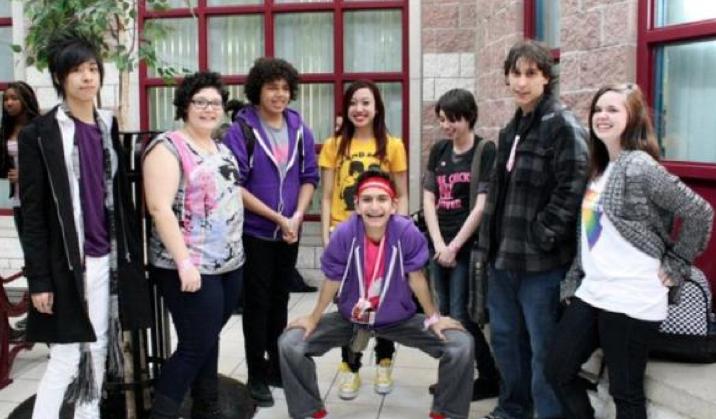Ontario Catholic schools have been given the green-light to allow anti-bullying groups, but steps are being taken to ensure groups don’t adopt names that are “too gay-sounding.”
The students at St Joseph Catholic Secondary School chose Rainbow Alliance, but the principal rejected it, telling 16-year-old Mississauga student Leanne Iskander that the name is “too LGBT-sounding.”
Iskander is one of nine students throwing their hats into the ring for a spot on a new provincial committee made up of clergy, trustees, administrators, parents and educators who will decide what’s best for Catholic students demanding gay-straight alliances (GSAs) in their schools. One of the big issues the committee will tackle is what to call the groups.
As announced in an April 15 memo sent to all Ontario Catholic school boards, the Assembly of Catholic Bishops and the Ontario Catholic School Trustees’ Association (OCSTA) are forming a committee to finalize a “framework” to guide school clubs addressing “bullying related to sexual orientation.”
President of the OCSTA Nancy Kirby tells Xtra that GSAs are still banned at all Ontario Catholic schools. That’s because a GSA signals to students that the group is focused on activism, she explains.
“It won’t be a gay-straight alliance,” she says. “When I look at a gay-straight alliance, I see an activist group. We are answering the students’ request for support and assistance, not for activism. Students don’t want to become activists; they want to be supported in being bullied by their peers.”
Is standing up against anti-gay bullying not activism? “In some ways it could be and in other ways it isn’t,” she says. The groups will all have a “common name.”
“We don’t know what that name will be,” Kirby says. “All we know is, up until recently, we felt the resources we had in place at our schools were supporting all of our students from bullying.”
For the St Joe’s students, it means they will get a club, even if it remains unnamed. Principal Frances Jacques is pushing for the group to be called “Open Arms,” Iskander says.
“[At a meeting on April 26] the principal just kept saying, ‘It’s not a GSA. It’s not a GSA.’ She doesn’t like the political aspect and the political affiliation,” she says. “The principal won’t let us have anything remotely LGBT for the name. All the students have an issue with this. How will new students know about it?”
“We are going to get together to come up with some more names to propose to her. So we’ll see how that goes.”
Iskander first became involved in the fight for GSAs when her request was denied in March. Her group started with 32 students and now has 40. Since going public, the students have faced vicious bullying in class and online, illustrating why a GSA is so important.
The St Joe’s students are planning an anti-homophobia event on June 3 at the school. Iskander says the event will double as the official launch of the club.
“We’ll probably put up a big booth in the atrium,” she says. “We want it to be as big and noticeable as possible.”
Meanwhile, the provincial committee met for the first time April 28 and will begin work May 1, OCSTA’s Kirby says. The goal is to have a framework in place by September to give to Catholic school boards.
The final list of committee members is not finalized. There will be representation from likely only one student, Kirby says. The president of the Ontario Student Trustees’ Association has already been invited. “We want someone from each of the ICE (Institute of Catholic Education) sectors.”
Kirby says it’s too early to say if the groups will focus solely on gay, lesbian and trans issues, or if the groups will be “umbrella equity clubs.”
The memo states that the groups will have a “Catholic perspective,” meaning the Pastoral Guidelines to Assist Students of Same-Sex Orientation will most likely be used to guide discussions.
The pastoral guidelines, developed by the bishops at ICE, reads that “gay” is not an identity, gay sex is “immoral and sinful” and gay people ought to live a life of “chastity.” It is the primary document for instructing school administrators and teachers on homosexuality.
Kirby said unequivocally that the groups will not use Courage International as a resource or council students that they can be “cured” in any way. Courage uses the 12-step program developed by Alcoholics Anonymous to pray the gay away.
Xtra reported in March that pamphlets were available to students in the St Joe’s guidance office and the principal handed them out to teachers at a staff meeting. Kirby says Courage is “definitely not” a resource used at any other Ontario Catholic school.
“Courage pamphlets should never have been given to students,” she said sternly. “That was the first time I had ever heard of it. That was just one principal and [the pamphlets] have been pulled.”
Archbishop Thomas Collins was unavailable for comment.
GSAs started making headlines in January after Xtra reported a ban on the student clubs by the Halton Catholic District School Board. Board chair Alice Anne LeMay told Xtra then that the board “doesn’t allow Nazi groups either. Gay-straight alliances are banned because they are not within the teachings of the Catholic Church.”
Xtra revealed in February that GSAs are forbidden at all Ontario Catholic schools.
Kirby says that, slowly, the church is changing. “The church realizes there are people in our world, in our schools, who are gay or lesbian, and it’s not a sickness.”

 Why you can trust Xtra
Why you can trust Xtra


